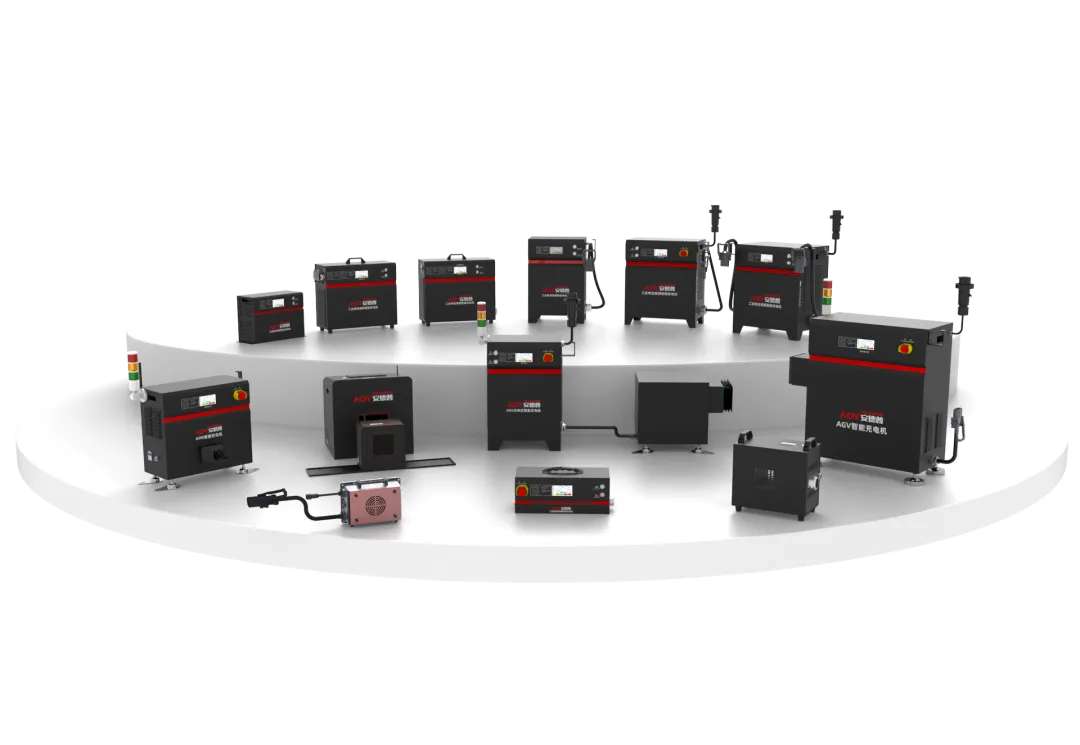Blog
Six Major Trends in Future Industrial Charging Technology
2025-06-26 | Calvin

With the acceleration of industrial automation, industrial charging technology—serving as a key supporting pillar—is also evolving rapidly. It’s moving toward more efficient, smarter, and greener solutions while steadily progressing toward scalability and standardization.
Trend 1: Integration and Miniaturization
With ongoing advancements in power electronics, the internal circuits and structures of chargers are becoming more compact. By adopting integrated power modules and optimizing PCB layouts, chargers can deliver the same power output while being smaller and lighter. This makes them easier to install and operate—especially valuable in industrial settings with limited space.
Trend 2: Wireless Charging
Based on the principle of electromagnetic induction, wireless charging eliminates the need for mechanical contact. This enables a barrier-free environment, reducing material wear and failure rates. As a continuous power supply method and a solution for opportunity charging, wireless charging is expected to become a mainstream trend in future technology development.
Trend 3: High Power and Efficiency
In the near future, industrial chargers may offer ultra-fast charging similar to smartphone fast-charging—reaching 80% capacity in just 5–10 minutes, dramatically reducing wait times. “Ultra-fast charging” technology will be widely adopted across industrial sectors. By optimizing circuit design, using new power devices, and implementing advanced control algorithms, energy conversion efficiency will improve, reducing energy loss and operational costs.
Trend 4: Enhanced Intelligence and Automation
With the help of artificial intelligence and the Internet of Things (IoT), industrial chargers will become significantly smarter. For example, remote monitoring and management will allow staff to view charger status and battery levels via smartphones or computers. Remote operations like starting or stopping the charge will also be possible. Automatic fault detection and early warning functions will monitor real-time performance, send alerts in case of potential faults, and take protective actions. Maintenance teams will receive diagnostic messages promptly, speeding up repairs. Moreover, intelligent alerts can adapt charging strategies based on battery condition and equipment usage, boosting efficiency and battery lifespan.
Trend 5: Improved Standardization and Compatibility
To ensure compatibility among industrial equipment and chargers from different brands and models, industry standards will continue to be refined and unified. Charger manufacturers will follow standardized specifications in design and production to ensure seamless matching and safe charging with a wide range of compliant industrial devices. This will help break down barriers within the industry and foster healthy market growth.
Trend 6: Green and Eco-Friendly Development
As environmental regulations tighten, industrial chargers will place greater emphasis on eco-friendliness. Energy-saving technologies such as soft-switching and power factor correction will reduce energy consumption and enhance efficiency. Environmentally friendly materials will be prioritized to minimize environmental impact. Charger designs will also aim to reduce electromagnetic interference, preventing disruption to surrounding electronic devices and communication systems.
- Next:What Is Lithium Battery Protection Mode?
- Previous:Tesla Battery Types: A Simple Guide for Model S, 3, X, and Y
Contact Details
Lithium LiFePO4 Batteries and Lithium LiFePO4 Cells Supplier - LiFePO4 Battery Shop
Contact Person: Miss. Elena Wang
WhatsApp : +8615263269227
Skype : +8615263269227
WeChat :15263269227
Email : info@lifepo4batteryshop.com
All Products
- A123 Battery (5)
- Sinopoly Battery (7)
- GBS Battery (16)
- CALB Battery (22)
- Cylindrical Cell (3)
- Energy Storage System (0)
- Battery Management System (2)
- Sodium ion Battery Cell (3)
- Lithium Titanate Battery (16)
- Ternary Lithium Battery Cell (11)
- REPT Battery (8)
- BYD Battery (2)
- CATL Battery (14)
- Thunder Sky Winston Battery (21)
- EVE Battery (29)
- LiFePO4 Battery Cell (4)
Certification
Customer Reviews
- I have fond memories of our meeting in Shanghai with LiFePO4 Battery Shop Elena. Your company left a strong impression on me with its impressive growth and professionalism. We both value straightforwardness and honesty, which I believe are the most important qualities in any partnership. I am confident that we can build a successful collaboration based on these shared values. —— Robert from USA
- I've been working with LiFePO4 Battery Shop for years, and their reliability is unmatched. While other suppliers frequently change sales teams, LiFePO4 Battery Shop has consistently provided exceptional service with a stable team. Their commitment to quality and customer support truly sets them apart. —— Henry from Australia



